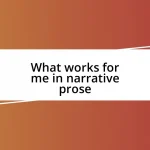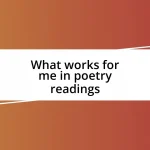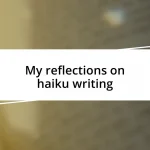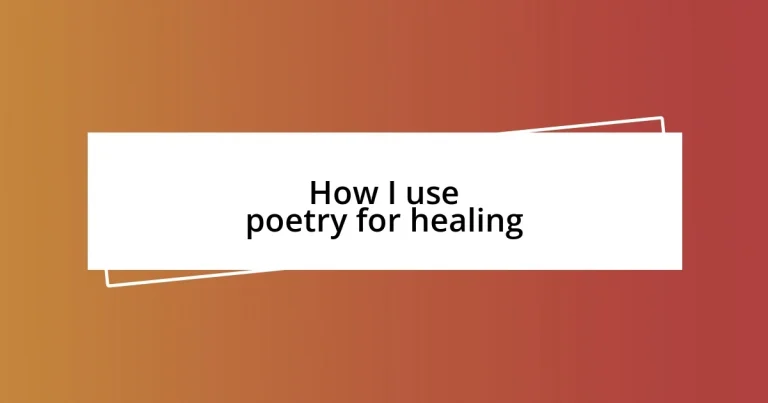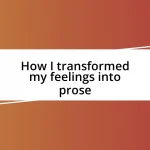Key takeaways:
- Writing and reading poetry facilitates emotional healing by providing an outlet for feelings and fostering connection through shared experiences.
- Creating a safe and mindful environment for writing enhances creativity and allows for deeper self-reflection and exploration of emotions.
- Sharing poetry with others builds community and transforms personal struggles into collective journeys of healing, reinforcing the power of vulnerability.
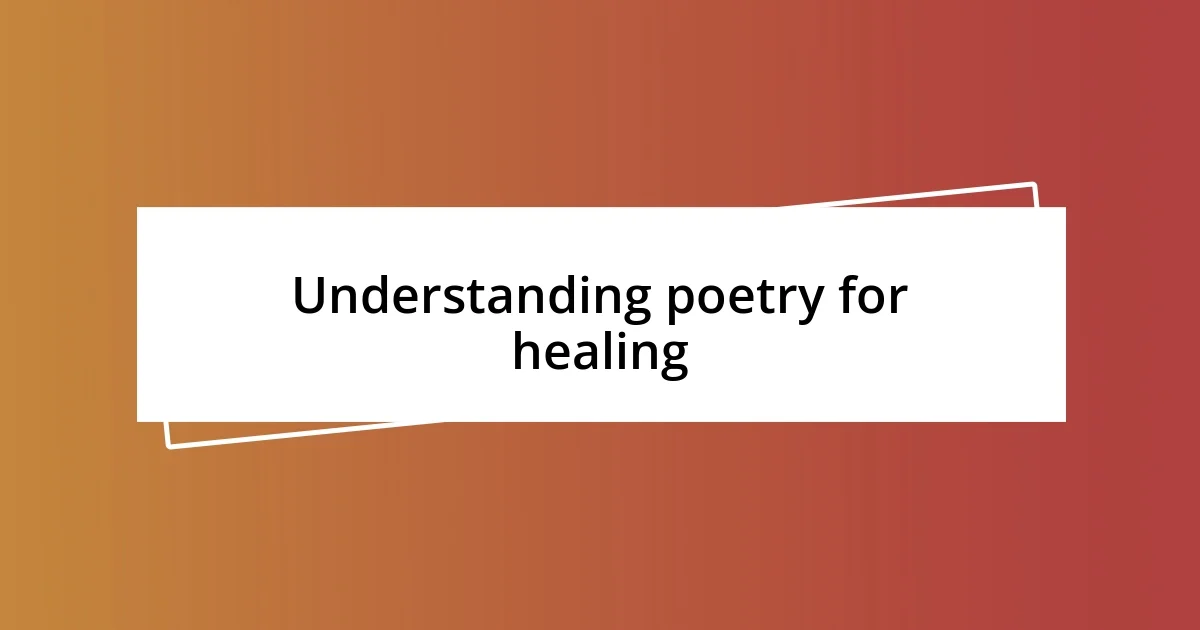
Understanding poetry for healing
Poetry has always been a sanctuary for my emotions. When I faced a particularly challenging time, I discovered the power of words strung together in a way that resonated with my inner turmoil. Have you ever felt that rush of relief when you read something that perfectly captures your feelings? That connection can be incredibly healing.
I often reflect on how writing poetry allows me to process experiences that feel overwhelming. Each line I compose becomes a stepping stone toward understanding emotions I might struggle to express. It’s as if I’m piecing together a puzzle—every word contributing to a clearer picture of my pain and growth. This act of creation helps transform my feelings into something tangible.
When I read someone else’s poem, it feels like a mirror reflecting my own struggles. I remember a moment where I stumbled upon a verse that echoed the grief I was experiencing after a loss. Instantly, I felt less alone. That’s the beauty of poetry; it invites vulnerability while fostering a profound sense of connection. Isn’t it comforting to know that others have navigated similar paths?
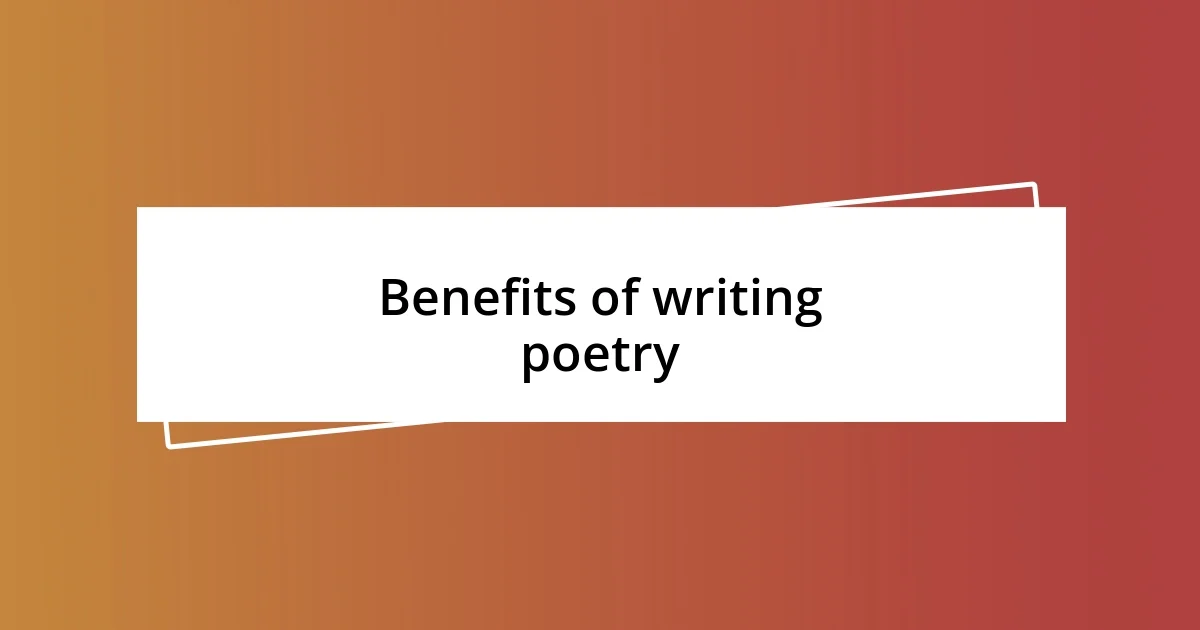
Benefits of writing poetry
Writing poetry has immense benefits that extend beyond mere words on a page. For me, crafting a poem can serve as a powerful emotional release. I remember sitting down after a long, stressful day and letting my thoughts flow onto the paper. It was like a weight lifted off my shoulders; suddenly, my anxious feelings became organized expressions instead of chaotic turmoil. The act of writing ground me and helped put my worries into perspective.
Moreover, writing poetry nurtures self-reflection. When I delve into my emotions through poetry, I often uncover layers of feelings I didn’t even know existed. It’s like unearthing treasure hidden beneath the surface. I recall a time when I wrote a poem about my childhood; it opened floodgates of nostalgia I hadn’t revisited in years. That exploration illuminated certain aspects of my past that needed healing and closure. This depth of insight can be transformative, offering clarity and understanding.
Finally, poetry fosters creativity in ways that reinforce resilience. Each time I embrace that creative process, I cultivate a sense of accomplishment. I often look back on my poems and see the growth reflected within them—just like a personal timeline of my healing journey. It reminds me that even in my darkest moments, I can create something beautiful. Isn’t that a powerful motivator to embrace the pen and paper?
| Benefit | Description |
|---|---|
| Emotional Release | Writing poetry allows for a crucial outlet for emotions, helping to alleviate stress and anxiety. |
| Self-Reflection | Poetry encourages exploration of one’s feelings, leading to deeper understanding and healing. |
| Creativity and Resilience | Engaging with poetry cultivates creativity and fosters a sense of accomplishment and growth. |
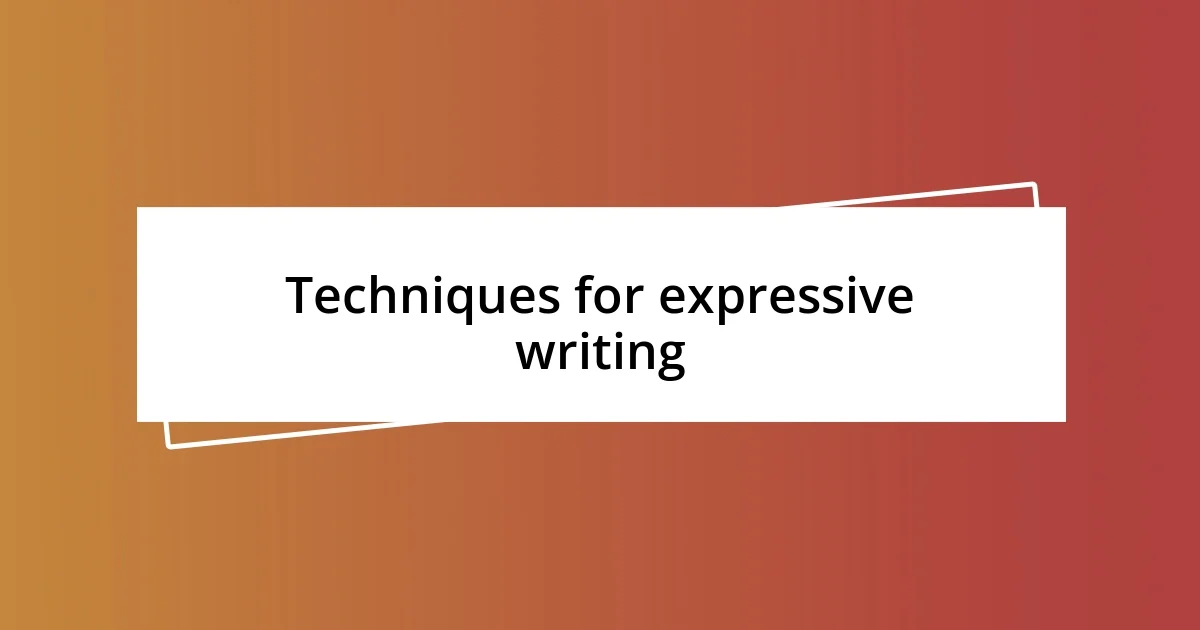
Techniques for expressive writing
Expressive writing techniques can significantly amplify the healing process. Personally, I’ve found free writing to be incredibly liberating. It’s just me, pen in hand, pouring my thoughts onto the page. There’s no right or wrong here—just raw honesty spilling out. I recall a particularly tough evening after an argument with a friend. Instead of bottling it up, I let my pen capture my frustration and sadness without worrying about structure. That unfiltered expression acted as a cathartic release.
Here are some techniques that I often use:
– Free Writing: Write continuously for a set time without worrying about grammar or structure.
– Journaling: Document daily thoughts and feelings to track emotional progress over time.
– Prompts: Use specific prompts to spark inspiration, such as a line from a favorite poem.
– Letter Writing: Write letters to yourself or others that you may never send, allowing for deeper emotional exploration.
Another technique I embrace is using sensory details in my poetry. By vividly describing feelings, sights, smells, and sounds, I create a more immersive experience for myself and my readers. For instance, while writing about my childhood home, I focused on the smell of fresh cookies baking and the sound of my little brother’s laughter in the backyard. This practice not only deepened my connection to the memories but also made the healing process richer and more relatable. I believe this approach helps convey emotions in a way that resonates with both my heart and those who read my work.
Engaging with these techniques has transformed my poetry into a vibrant emotional landscape—a space where I can explore and heal.
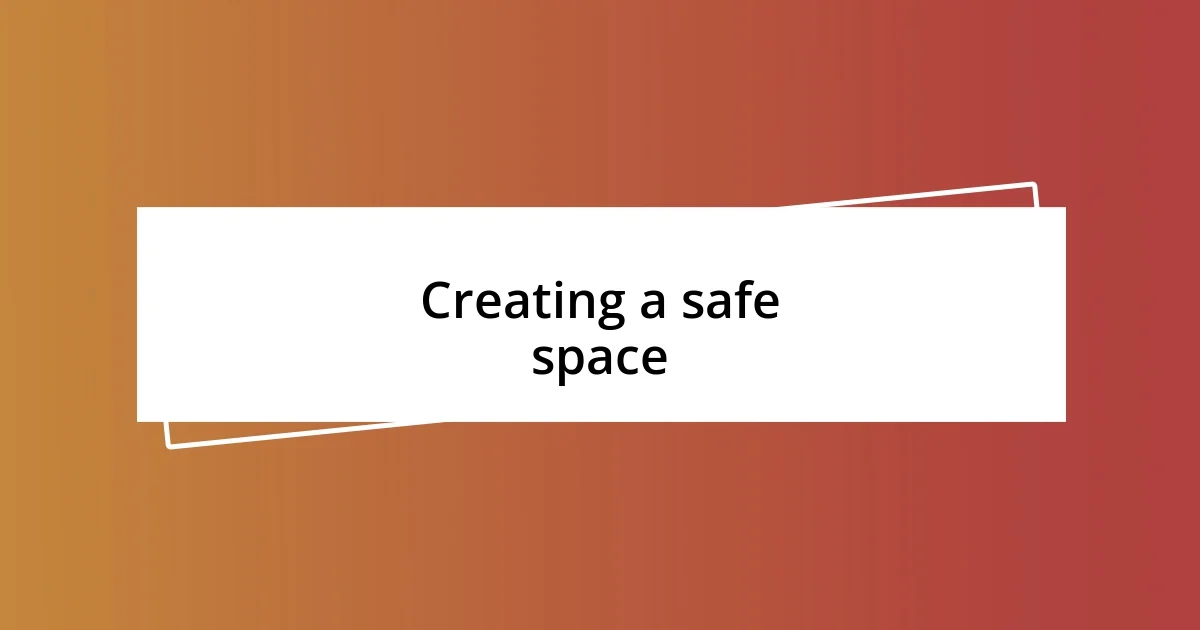
Creating a safe space
Creating a safe space to write poetry is essential for my healing process. I often find that lighting a candle and choosing a cozy corner in my home instantly puts me in the right mindset. Once, in a dimly lit room, surrounded by familiar books, I felt a wave of calm washing over me. Have you ever noticed how certain environments can shift your mood entirely? It’s almost magical when you’re in a place that feels just right.
In addition to a physical space, I’ve learned the importance of setting an emotional tone. Before I write, I take a moment to breathe deeply and remind myself that this is a judgment-free zone. There’s power in that realization. I remember a time when I struggled with self-doubt, worrying about the quality of my poetry. But once I embraced the idea that my thoughts and feelings were enough, I opened the floodgates to genuine expression. It was liberating!
Sometimes, I play soft music or nature sounds in the background to enhance my safe space. Music has a way of enveloping me like a warm blanket, making it easier to be vulnerable on the page. Have you ever felt that connection between sound and emotion? It’s as if the melodies carry my worries away, allowing my pen to dance freely across the paper. Sharing this space with my creativity has become a sanctuary where healing feels not only possible, but beautiful.
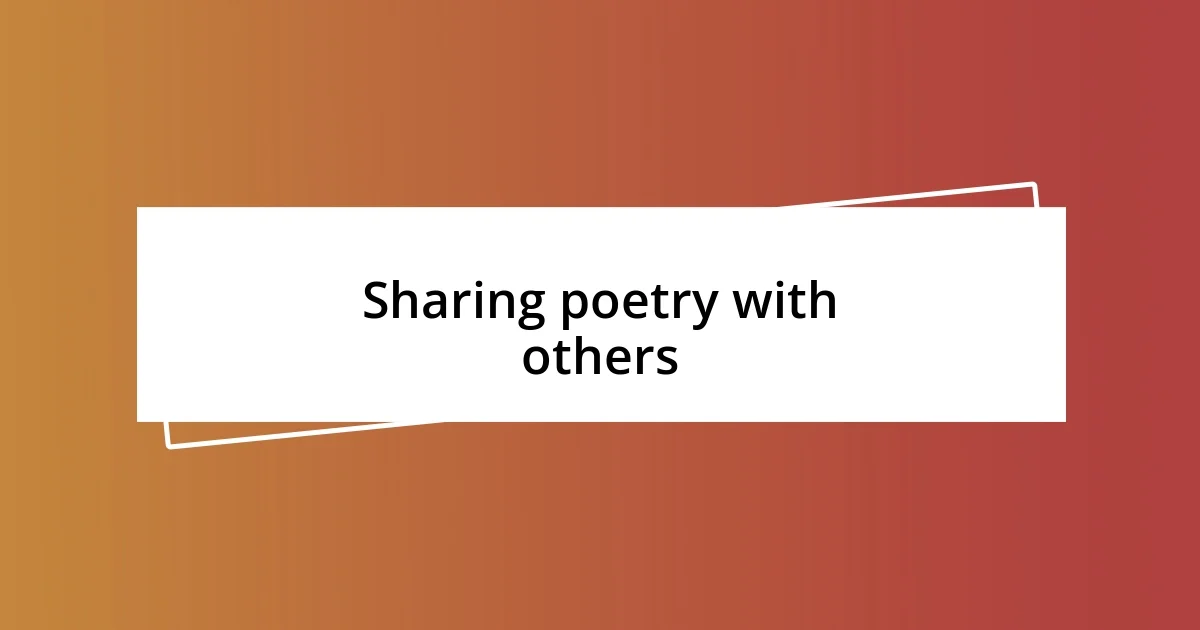
Sharing poetry with others
There’s something truly special about sharing poetry with others. When I share my work, I often feel as though I’m opening a window into my soul. One evening, I participated in a local poetry reading, and as I recited a piece about resilience, I glanced at the audience. The subtle nods and the glimmers of understanding in their eyes made me realize that my words were resonating with their experiences too. Have you ever shared something deeply personal and felt an immediate connection with others? It’s a remarkable sensation.
Additionally, engaging with a community of fellow poets can be incredibly uplifting. I recall joining a poetry workshop where we exchanged our pieces and offered feedback. Not only did I gather invaluable insights to improve my writing, but I also witnessed the healing power of shared stories. Listening to others reveal their struggles and triumphs through poetry opened my eyes to the diversity of human experience. In those moments, I felt less alone, as if our collective vulnerability created an invisible bond among us.
Building a safe and supportive environment for sharing poetry is paramount. Once, I organized a small gathering at my home for friends to share their work. We created a cozy atmosphere with soft lighting and warm drinks, inviting honesty and openness. As we listened and applauded each other’s raw expressions, I was overwhelmed by a sense of community. Isn’t it beautiful how our words can bring us closer, turning solitary experiences into shared journeys of healing? This connection is what makes sharing poetry so transformative.
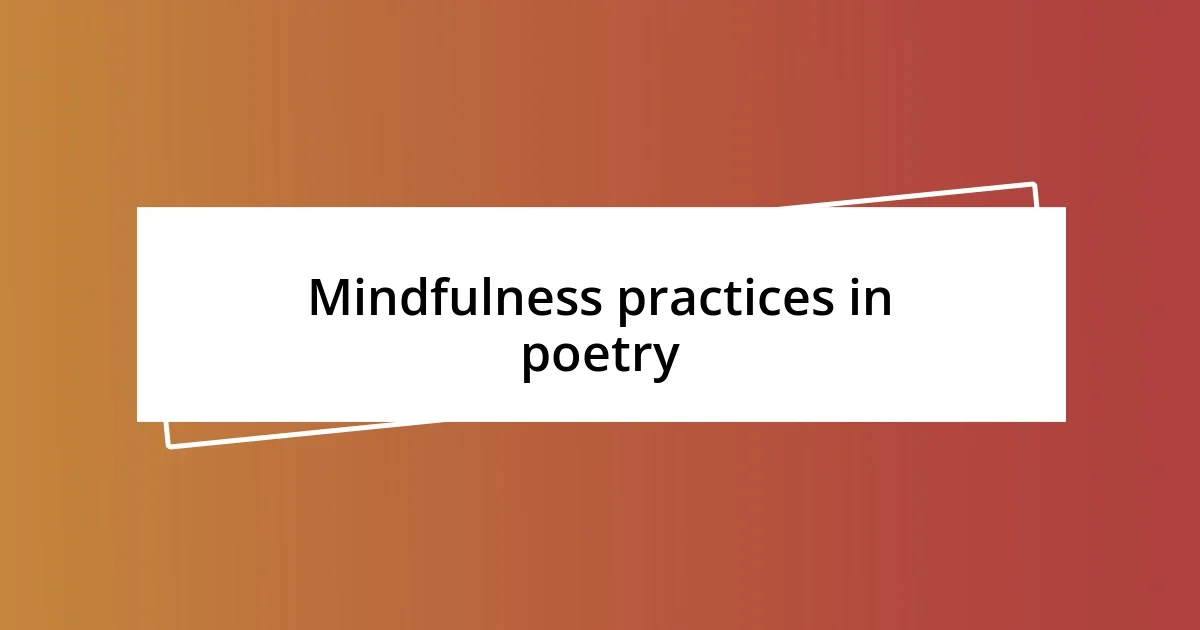
Mindfulness practices in poetry
Engaging in mindfulness practices while writing poetry allows me to immerse myself fully in the moment. I often begin by focusing on my breathing, letting it guide me into a state of presence. It’s fascinating how just a minute of deep breathing can quiet the chaotic thoughts racing through my mind. Have you ever noticed how slowing down can unlock your creativity?
I’ve also found that free writing serves as an excellent mindfulness tool. I set a timer for ten minutes and write without stopping, letting my thoughts flow uncensored onto the page. During one of these sessions, I discovered hidden emotions swirling beneath my surface. It surprised me to see how my worries transformed into vivid imagery and metaphors, connecting me deeply with my inner landscape. This practice doesn’t just feel cathartic; it creates a tangible link between my emotional state and the art I produce.
Incorporating nature into my poetry writing adds another layer of mindfulness. I often sit outside, surrounded by the sounds of chirping birds and rustling leaves, and allow the environment to inspire my words. One afternoon, as I penned verses beneath the shade of a large oak tree, I felt a profound sense of unity with the world around me. There’s something soothing about being in nature that heightens my awareness. Have you ever found insights about yourself hidden within the beauty of your surroundings? Those moments of reflection often lead to the most powerful poetry.
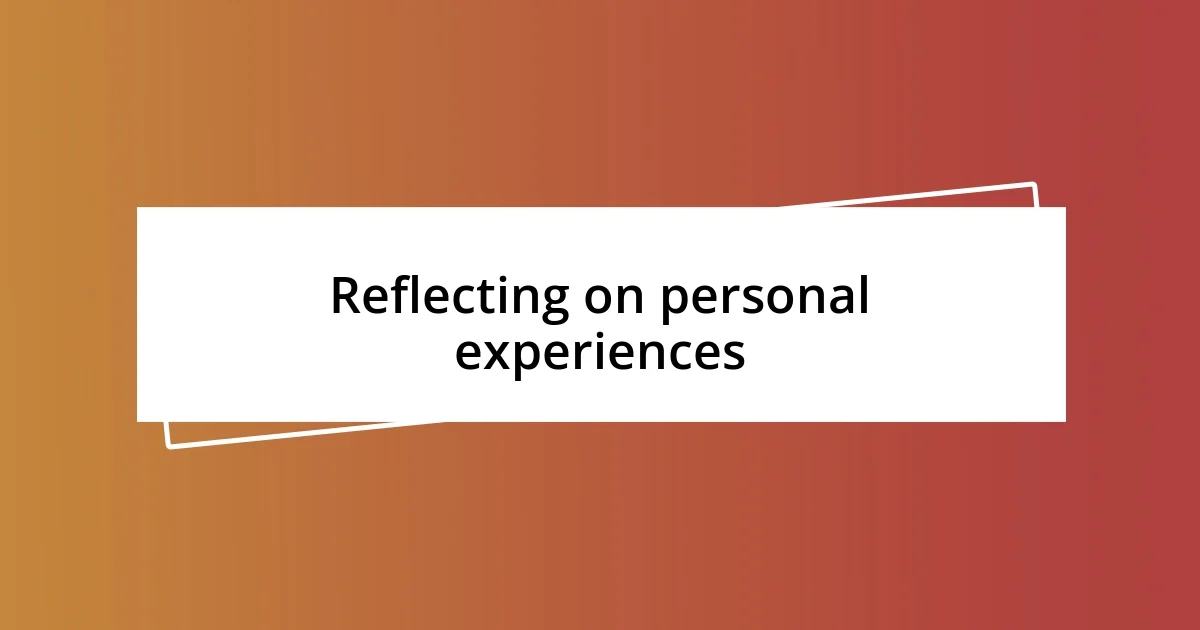
Reflecting on personal experiences
Reflecting on personal experiences has been a transformative part of my poetry journey. Recently, I stumbled upon an old notebook filled with poems from a particularly challenging time in my life. As I re-read those pieces, I felt a wave of nostalgia wash over me—both painful and comforting. Isn’t it interesting how revisiting our past can sometimes offer clarity, even if the memories are bittersweet?
In one poem, I wrote about the quiet moments filled with doubt and fear, which I now see as stepping stones to growth. It’s almost astonishing how those raw, unfiltered emotions found their way onto the page, capturing a phase of my life that felt overwhelming. Have you ever poured your heart into words and, only later, realized how far you’ve come? Each line serves as a reminder of resilience, and I take solace in the fact that my experiences have contributed to who I am today.
I often find myself reflecting on these poems during moments of solitude. There’s something profoundly healing about sitting in silence with my thoughts, allowing them to swirl around me like autumn leaves. One evening, as I sipped tea and pondered a piece that spoke of heartache, I noticed how those very themes of loss had shifted into narratives of hope. It made me wonder—can the act of rewriting our stories through poetry truly change how we view our experiences? For me, the answer is a resounding yes. Each reflection deepens my understanding, and it transforms pain into art.

